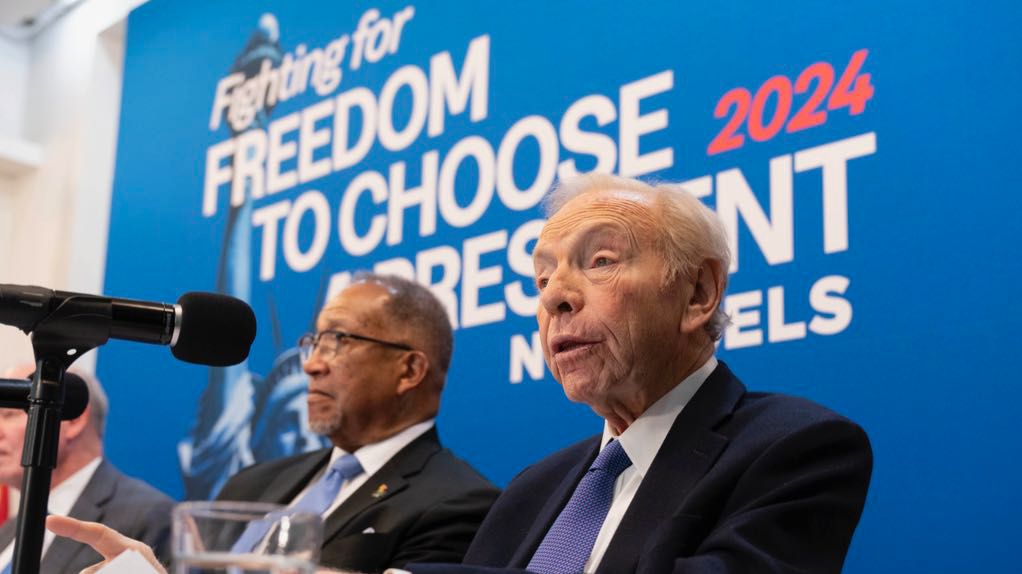Centrist political group No Labels this week detailed a methodology for selecting the candidates for a "unity ticket" that they plan to choose and support — and then leave to their own devices.
"Once the unity ticket is nominated, No Labels’ work is done, and the unity ticket will assume the task of building a campaign and capturing the hearts and minds of the American people in 2024," No Labels National Convention Chair and former Dallas Mayor Mike Rawlings said in a video announcement. "This is a unique American moment where we have a chance to make history."
Indeed, No Labels — which has taken pains to insist that it is an organization, rather than a political party — is hoping to buck the existing two-party system and launch a relative outsider past President Joe Biden and former President Donald Trump.
"Even though both major parties have settled on their presidential nominees, it’s clear the American people are still searching for another choice," former Sen. Joe Lieberman, a founding chair of No Labels, said in an announcement.
Prospective candidates for the No Labels nomination will be vetted by the organization’s "Country Over Party" Committee, a 12-person group that includes Lieberman.
Any prospective candidate for the ticket must adhere to two conditions for the nomination: endorsing No Labels’ "Common Sense Booklet" — so named for Thomas Paine’s 1776 pamphlet "Common Sense," which called for the American colonies to declare independence from the British crown — and promising to adhere to six ideals, which advocate for tolerance and appreciation for disagreement, care of country over party and supporting the American military.
"We are searching for candidates with values and ideas that reflect those of the commonsense majority as well as the courage to challenge America’s broken two-party duopoly," Lieberman said. "If No Labels is unable to find candidates who meet this high threshold, then we simply will not offer our ballot line to anyone."
As of January, No Labels has won ballot access in 13 states — Alaska, Arizona, Arkansas, Colorado, Florida, Hawaii, Maine, Mississippi, Nevada, North Carolina, Oregon, South Dakota and Utah — and the group said it is working on ballot access in 14 more states.
However, despite seeking ballot access in states across the country, No Labels appears to specifically be targeting the presidential election. In January, a judge ruled that No Labels can prohibit members from using its ballot line to run for state office in Arizona.
Who the presidential candidate might be is a mystery. Big ticket candidates, like retiring West Virginia Sen. Joe Manchin, a Democrat, and former Republican governors Nikki Haley, Larry Hogan and Jon Huntsman have all professed no interest in aligning with No Labels.
The great concern for some political onlookers is that No Labels might propel Donald Trump to the presidency.
A founder of the organization, William Galston — a senior fellow at the Brookings Institution — resigned from the group last April, citing polling suggesting that current Democrats are more likely to be ideologically moderate than Republicans.
"A center-seeking candidate would therefore appeal to more Democrats than Republicans, and a winning Democratic coalition would include far more moderates — including moderate independents — than a Republican coalition," Galston wrote in an Wall Street Journal op-ed last year. "Mr. Biden can win the 2024 election if he is able to consolidate the anti-Trump vote, as he did in 2020. But if a No Labels ticket receives even a tiny share of the vote in key states, Mr. Trump could end up back in the Oval Office."
A further sign of potential discontent within the organization came Wednesday, when former North Carolina Gov. Pat McRory stepped down as the organization’s national co-chair.
In a statement to NBC News, he simply said that "it is now time to move on," offering his well-wishes to the organization.



